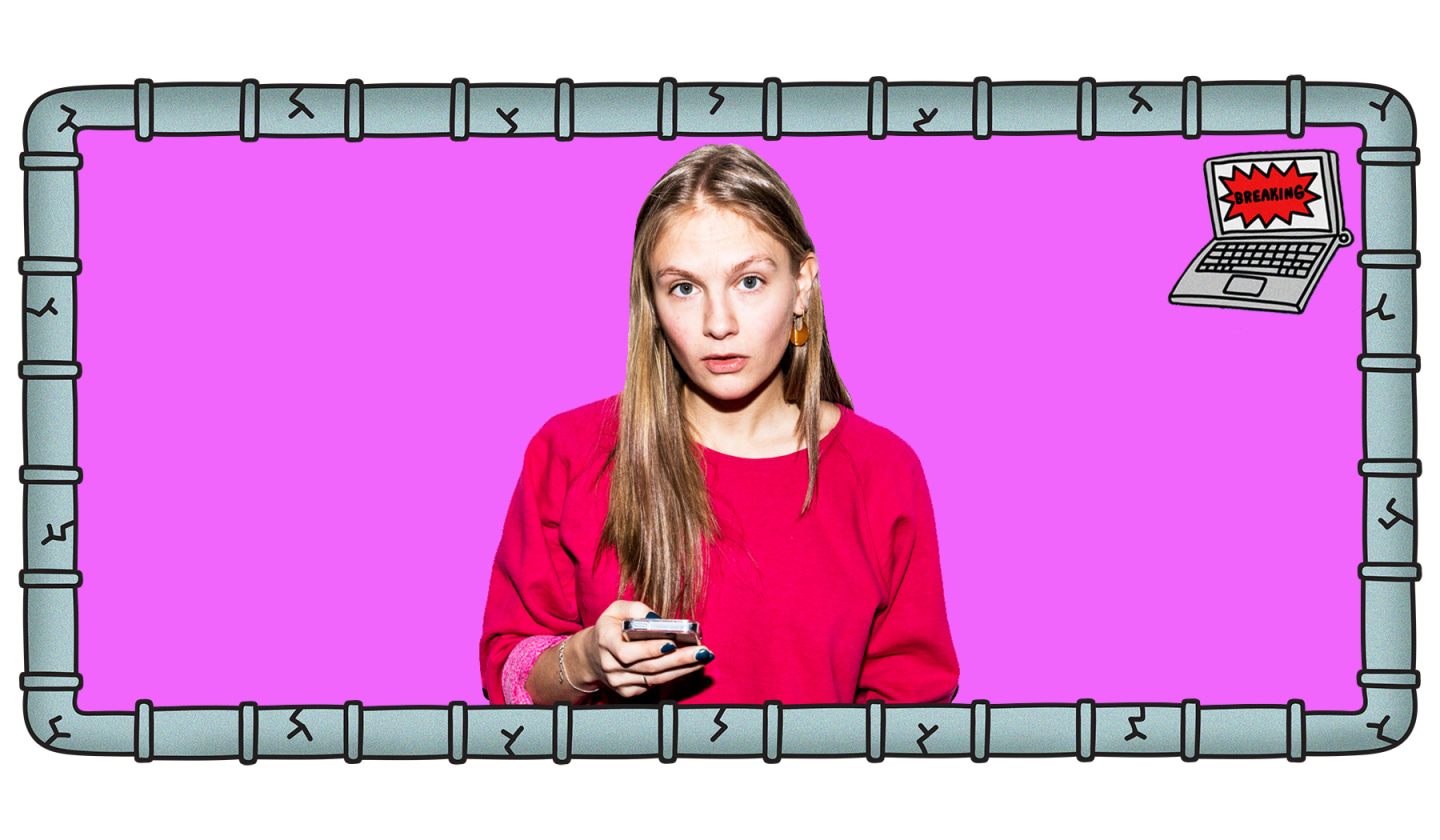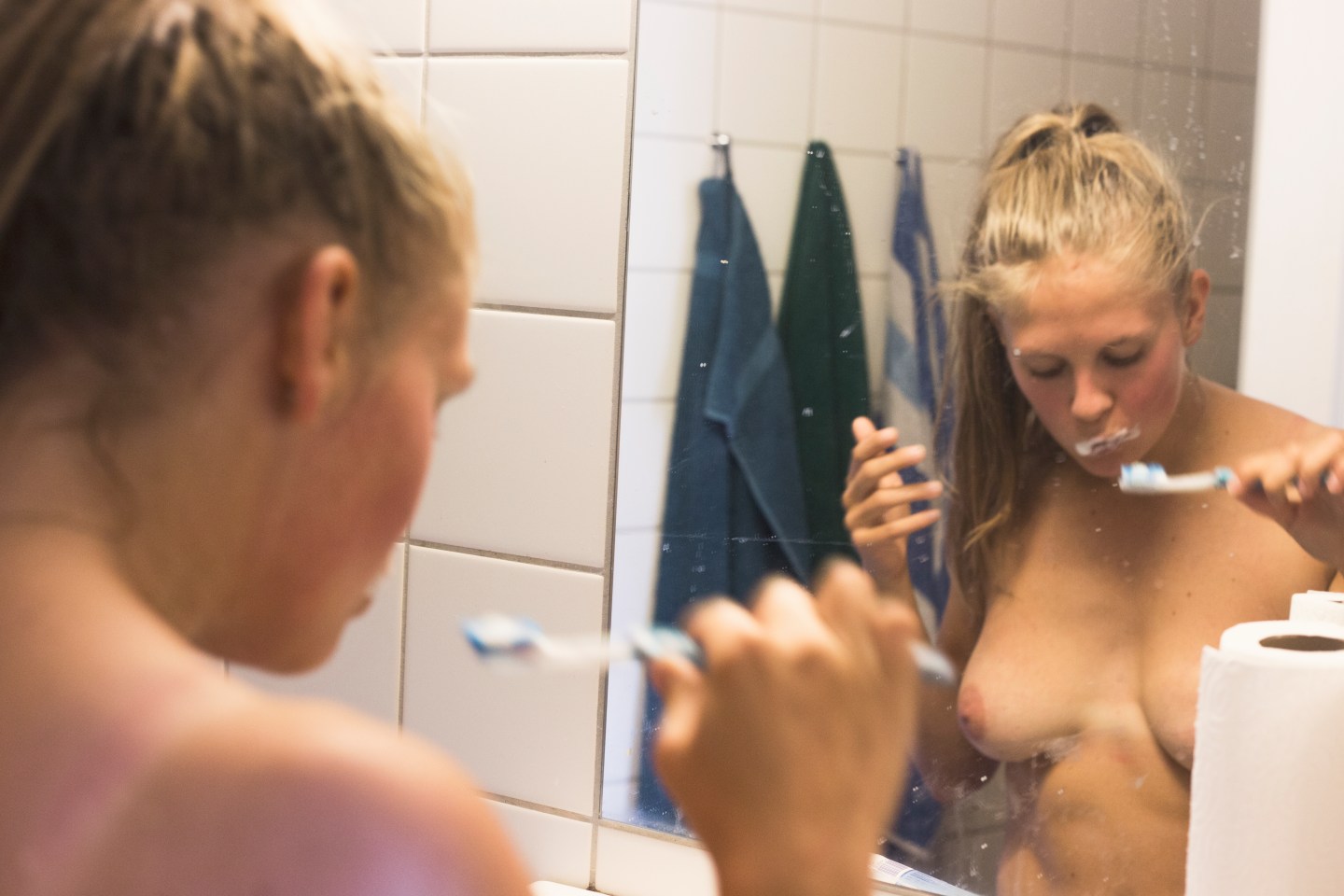Stop Looking At Stolen Nudes
Emma Holten’s life was changed by a hacker who leaked intimate photos. Here, she explains how she turned the tables.
 Emma Holten
Peter Stanners
Emma Holten
Peter Stanners
On an otherwise normal day in 2011, 20-year-old Danish student Emma Holten woke up to find that her Facebook and email accounts wouldn’t accept her usual password. When she eventually managed to log in, she was greeted with hundreds of messages from strangers. Scrolling through the pages of harassment, she pieced together what had happened: someone had stolen her private nude photographs, and they had already been published on several “revenge porn” websites. To this day, she doesn’t know who did it.
“When we hear about non-consensual pornography victims, [the coverage] tends to focus on their sexual escapades, their boyfriends or whatever,” she reflected, in her cheerful-sounding Danish accent, over Skype from her home in Copenhagen. Many victims of revenge porn are depicted in the media as sexual deviants, but when Holten saw the other side, she realized it could happen to any “regular kid.” The following years were what Holten described as a “very dark period of my life.” The photos haunted her: anonymous taunters sent them to her friends, family, and co-workers; some even tried to blackmail her into sending more. She received “everything from benign sexism to full-on rape threats.” She was scared to go on dates, apply for jobs, or publish anything online. She was scared of what might come up in a simple Google search of her name.
In 2015, Holten came up with a plan to take back control. Teaming up with photographer Cecilie Bødker Jensen, she posed for a topless photo shoot in her apartment. This time she shared the images far and wide, on her own terms. This was the beginning of Holten’s CONSENT project, which has the aim to teach people about how important consent is in the distribution and viewing of imagery. Holten doesn’t care if you see her naked — she cares if you do so without her permission. The distinction, she explained, is crucial.
What was the aftermath of being hacked like for you?
Kind of like a person who has been a victim of sexual assault in the “real world,” there are different phases. First, I felt, This is obviously very humiliating, but if I just ignore it, my life will continue as usual. After about a month, it became apparent to me that that was not going to be the case. I was very shocked by the level of participation in the violence against me.
That's when it really started to take a toll on my mental health — when I started to understand that a lot of people respected me less, and thought that I was worth less. A lot of men expressed [to me] that they would never be with a person that had been a victim of what I had been through. People would get out their mobile phones at parties and pass the pictures around. That was when I really started to have serious doubts about whether I would just lead a regular life. I started to feel incredibly powerless and extremely depressed.
One thing that was a strength for me was that I always knew that I hadn’t done anything wrong. I think a lot of victims spend a lot of time feeling ashamed that they took naked pictures, or feeling somehow that they are to blame for what had happened. I had these thoughts, of course. But that was never my main issue. But it doesn’t really make a difference that I don’t feel ashamed whilst everyone else thinks I should feel ashamed.
Do you believe the people that looked at and shared these images without your consent are as much to blame as the people who initially stole them?
Yes, I definitely think so. A lot of people ask me, “Are you never curious as to who the first person was?” But no. That person has faded into the background for me. I think the reason that we are very focused on the first share, is because it makes it easier to talk about. We talk about him as a criminal, we talk about him as this social outlier, an exception to the rule of human behaviour. But as soon as we start talking about gaining power by humiliating others, and having a curiosity that trumps our respect for others — it becomes much more awkward. Because everyone [can] relate to it. If I was sent these pictures, would I look at them? I probably would if I wasn’t a victim of this. We were all curious about seeing Jennifer Lawrence naked.
There are much much more potent and toxic underlying things in this issue than just a teenage boy who is an idiot. There is a raging mob of people ready to consume this type of material. We have to start recognizing this. When you receive a death threat from a person who is sitting with his children on his lap on his Facebook profile picture, you start thinking, There is something going on here. It’s societal structure. This is what revenge porn is about — revenge porn is not about naked women. If you want to see a naked woman, you can find one. This is about feeling a rush of power from having a person's life in your hands. It’s so precarious and fragile, and you can just crush it. For a lot of people, that power is much more than they can handle. It’s too tempting.
 Emma Holten
Peter Stanners
Emma Holten
Peter Stanners
“The underlying question is, why do so many people participate in this? The term 'revenge porn' makes it sound as if we have a answer for this question, and we actually don’t.”
What do you think of the term “revenge porn”?
I am not a fan of the term. I use it because that is the word that people use for what I’ve been through. But what I think what it actually does is erases the profit motive that is in this: this is a huge business. And it makes it sound as if it’s a personal scuffle between two people that went wrong. But [most] people who abuse victims of revenge of porn don’t know the victim personally, and have no personal motive to abuse them. The underlying question is, why do so many people participate in this? The term “revenge porn” makes it sound as if we have a answer for this question, and we actually don’t.
Could you talk about the decision to have nude photos professionally taken of yourself and published?
When I had been living as a survivor for about three years, the story [of revenge porn] sort of began to spring up. When this had happened to me in 2011, it was not something people talked about in the news media, or politically. It was something that happened to Kim Kardashian and Paris Hilton, but we weren’t framing those stories in [terms] of consent. We were framing it as, of course, the woman's fault. When it started to become an issue that people talked about, I followed these debates with great interest. I thought, Finally people are seeing this as a societal issue. [But] it was mostly talk about, “What is wrong with young women today? Why do they take these pictures?” The entire debate [assumed] that women were behaving irresponsibly sexually, that we should be ashamed.
I wanted to highlight that, for me, the issue was not that people saw my breasts. I really didn’t care about that — but I wanted to decide for myself when people see them, and I had been denied that right. It was unfathomable to me that people thought sexuality was the problem here, that it wasn’t a violation of consent that was the problem. The CONSENT project was a way to talk about that. It isn’t nudity in itself that is shameful. I felt no one was talking about that angle, people were just talking to 55 year old sociologists about selfie culture. Fuck selfie culture! People violated me, why weren't we talking about that?
[When I took the pictures with Cecilie], for the first time in a long time I felt, This can go whatever way it goes, but at least I decided it for myself. At least I would feel I had some sort of control of the the trajectory over my own life, instead of being in the hands of strange people with an internet connection like I had been for three years. But the most liberating thing was starting to understand this wasn’t an issue that had anything to do with me personally. That it was much bigger than myself.
 Emma Holten, CONSENT
Cecilie Bødker Jensen
Emma Holten, CONSENT
Cecilie Bødker Jensen
Where is the conversation about consent at in Denmark right now? Do people know as much as they should?
I think in some ways it has been elevated. But even if public opinion has shifted a lot, we’re still left with the big hole, which is that we still live in a society where we essentially don’t have the right to consent to what’s public about us. It takes one person to film you having sex, or Photoshop your head onto something, for you to be me. That is something we need technical solutions for.
I meet with tech industry people, and I’m speaking at a press conference with Facebook and Google in Dublin soon. [I’m trying] to tell them the issues for a person who has their consent violated. We are seeing huge strides technologically, legally, and culturally. But it’s going to take a while. Sexism is a hell of a drug, and a lot of people don’t want to give it up.
Do you have any advice for people who might be going through what you have been through?
I’d rather twist the question around: I have advice for people who are not victims of this, because they are the ones who should fix this problem. There are always going to be evil people who drive this sort of crime. But I think 85% of people are in a grey zone — they know it’s going on, and they're not speaking up in their social groups. We need you to say, very clearly, you do not condone this behaviour. Don’t be friends with people who harass other people, don’t be friends with people share pictures non-consensually. Take victims’ sides — because I can’t be everywhere and say that I have worth and rights, that I deserve respect as a full human being. You have to say that for me sometimes.